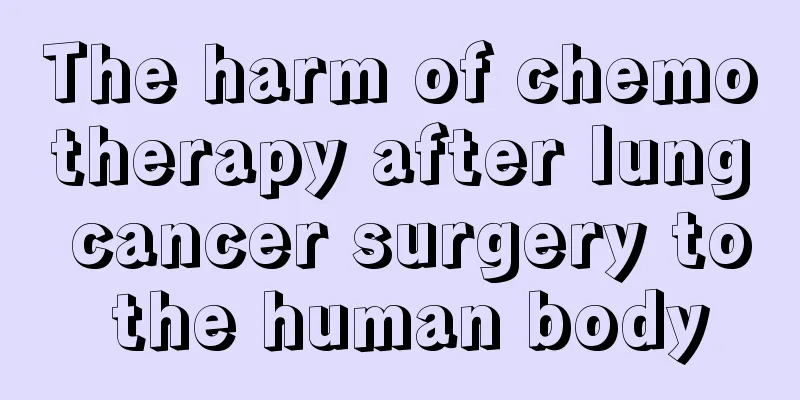The harm of chemotherapy after lung cancer surgery to the human body

|
Chemotherapy after lung cancer surgery is harmful to the human body. While chemotherapy drugs kill cancer cells, they also affect normal tissue cells. Its side effects mainly depend on the specific drugs and dosage. Common side effects of chemotherapy include nausea, vomiting, hair loss, oral ulcers, fatigue, etc. 1. Physical weakness: patients may experience general fatigue, mental depression, sweating, drowsiness, etc. 2. Decreased immune function: Chemotherapy drugs can damage the patient's immune system, leading to immune deficiency or decline. Immune function indicators such as E-roset test, CH50, C3 complement, T cell subsets, NK cell activity, interleukin II, etc., can all decrease to varying degrees after chemotherapy compared to before chemotherapy. Most anti-tumor chemotherapy drugs have immunosuppressive effects. 3. Bone marrow suppression: Most chemotherapy drugs can cause bone marrow suppression, which is manifested as a decrease in white blood cells and platelets, and even a decrease in red blood cells and hemoglobin. 4. Digestive disorders: decreased appetite, reduced food intake, nausea, vomiting, abdominal distension, abdominal pain, diarrhea or constipation, etc. Many chemotherapy drugs cause the above symptoms by irritating the gastrointestinal mucosa. 5. Inflammatory reaction: fever, dizziness, headache, dry mouth, mouth sores, etc. 6. Cardiotoxicity: Some chemotherapy drugs can produce cardiotoxicity, damage myocardial cells, and cause patients to experience panic and palpitations. Symptoms include chest tightness, discomfort in the precordial area, shortness of breath, and even heart failure. Electrocardiogram examination may show T wave changes or ST segment changes.7. Kidney toxicity: Some chemotherapy drugs in large doses can cause kidney damage and cause back pain, kidney discomfort, etc. 8. Pulmonary fibrosis: Cyclophosphamide, vincristine, bleomycin, etc. can cause pulmonary fibrosis. Chest X-rays show thickening or cord-like changes in lung texture. This is more dangerous for patients with poor lung function in the past, and can even be life-threatening. 9. Phlebitis: Most chemotherapy drugs are administered by intravenous drip, which can cause varying degrees of phlebitis. The color of the diseased blood vessels turns dark red or dark yellow, causing local pain and cord-like sensation when touched. In severe cases, it can lead to thrombotic phlebitis and blood flow obstruction. 10. Nervous system toxicity: mainly refers to the damage of chemotherapy drugs to peripheral nerve endings. Patients may experience numbness and dysesthesia of the extremities. For example, vincristine, vinblastine, vinblastine, and novoben may cause neurotoxic side effects to varying degrees. 11. Liver toxicity: Almost all chemotherapy drugs can cause liver damage. In mild cases, liver function abnormalities may occur and patients may experience discomfort in the liver area. In severe cases, toxic hepatitis may occur. 12. Cystitis: Ifosfamide, cantharidin, camptothecin, etc. can cause patients to experience a series of symptoms of drug-induced cystitis, such as lower abdominal discomfort or distension, hematuria, etc. |
<<: The hazards of radiotherapy for brain metastasis of lung cancer
>>: The dangers of lung cancer puncture
Recommend
How much do you know about the harm of dental calculus
When some yellow hard objects appear on our teeth...
Will lung cancer recur after surgery?
Lung cancer may recur after surgery, but the risk...
Acupuncture knife is used to treat knee sprains. The treatment effect is good
Knee sprains are common, but the effect of using ...
What are the methods for treating lymphoma?
I believe everyone has heard of the malignant dis...
What are the dangers of using nail grass to dye hair
There are many types of hair dyes in our lives. I...
Can paraquat cause pulmonary fibrosis
Some people may accidentally ingest paraquat. In ...
The peak age of endometrial cancer is 58-61 years old. What is the survival rate of endometrial cancer?
Women are prone to various gynecological diseases...
Will staying up late at night cause spots?
In midsummer, more and more people stay up late, ...
How long can you live without curing glioma
Once a disease like glioma occurs, it will have a...
What are the dietary health care methods for small cell lung cancer
What are the dietary health care methods for smal...
About new drugs for treating brain cancer
Regarding the new drug for treating brain cancer,...
What are the common symptoms of lymphoma
Nowadays, lymphoma appears more and more frequent...
What can't you eat if you have ovarian cancer
What can't you eat if you have ovarian cancer...
How do patients with prostate cancer take care of themselves
At present, prostate disease is a common disease ...
Everyone should know about the early symptoms of esophageal cancer
Any disease is more effective and thorough when i...









